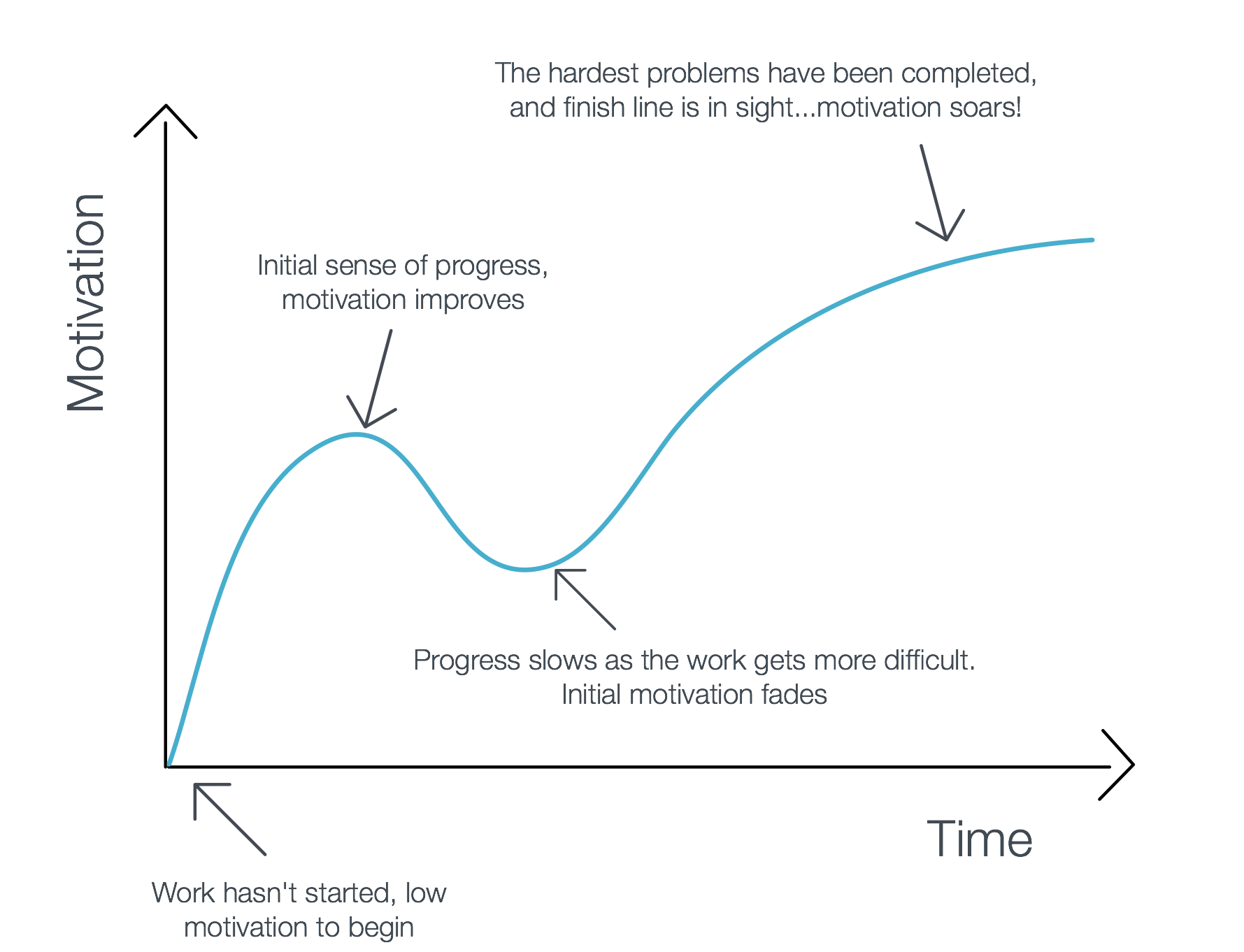Most students want to do well in school.
But wanting to do well doesn’t guarantee they will feel motivated to work on assignments in the moment. Even students who usually get good grades have days when they just don’t feel like doing homework or studying for their test tomorrow.
When we ask students what they need to do in order to improve their performance at school, many of them will tell us: “I just need to get more motivated!”
On the one hand, this makes a lot of sense.
If these kids were more motivated to do their work, it would certainly make it easier for them to earn better grades. And it is generally true that students who are doing well in school are generally more motivated and driven to succeed. However, sometimes I wonder if we may be mixing up cause and effect when it comes to motivation.
What if, rather than the motivation leading to progress, it is actually the progress that comes first…and the motivation that follows afterward?
Exercise is a good example of this principle.
I definitely have days when I do NOT feel very excited about going on a run early in the morning…but once I get out of the door and actually start running, I am able to complete the workout (and feel great afterwards).
When we talk with students about their work, there often seems to be a similar pattern.
When I asked one of my students about a recent essay he had completed, he recalled that he wasn’t very interested in the essay when he first sat down to begin working on it. But after he spent a few minutes brainstorming and came up with an interesting idea to write about, he felt much more motivated to continue.
My suspicion is that this pattern — of motivation kicking in AFTER we get into action, rather than beforehand — happens a lot more often than we realize.
And it makes sense, if you think about it.
Whenever we get started with something new, the first few minutes are pretty hard. There’s an initial ‘task switching’ cost of getting our brain switched over to this new activity, and it takes considerable effort to shut out competing ideas and get focused on our work.
There is also a lot of fear and anxiety that can arise at this point in the process, about whether we can really do this, how long it’s going to take, whether it will turn out the way we want it to, etc.
As a result, the first several minutes we spend working on a task often feel challenging and frustrating, rather than motivating.
But once we are over that initial hurdle, and have gotten “in the zone” where we’re focused on the task and starting to make progress, we get a sense of momentum and feel much more motivated to continue.
Here’s a graph of what this looks like, as a function of time…

There are a couple of important things to notice about this diagram:
- Motivation isn’t constant — it increases and decreases over time, depending on how much or little progress we’re making
- The more progress we feel like we’re making, the more motivated we feel
When it comes to motivation, I think a lot of students have things backward.
They think that they need to be motivated before they can start working…but in fact, it’s usually the opposite: they need to get started and get a sense of progress before they’re going to feel motivated to continue.
Does this mean that motivation isn’t important?
Absolutely not.
Motivation feels great!
In fact, we frequently work with our students to identify their motivation style and gain a better understanding of what motivates them.
Having these tools in place can help give students a greater sense of control over their work, and help them realize that even if they work itself is not intrinsically motivating, there are things students can do to help their brain engage with the work, and get more motivated to complete it. For example, it can help to find ways to make the task feel more novel, urgent, and/or intrinsically interesting (especially for students who have ADHD).
But the reality is that like all feelings, motivation is fleeting. If you have a bad day, or a task that feels like it’s going to be really challenging, sometimes even if you have all the best tricks in the world, you’re just NOT going to feel very motivated to work on it.
So, putting things off until you feel motivated to start them is a risky strategy.
It can sometimes work, but it’s not very reliable.
And as we’ve discussed, in a lot of cases, motivation is actually going to increase after you start working, not beforehand.
So, I would argue that while motivation is nice to have, it’s actually more important for students to develop the willpower and self-discipline to get started with their work, whether or not they’re feeling highly motivated to do it.
HOW to get started (if you’re particularly unmotivated)
Three strategies students can use to help make getting started easier are to…
- Move your body. If you’ve been sitting on the couch feeling lazy or staring at a blank screen trying to work but getting nowhere, the first step is to get up and move your body. Getting your body moving can help get your brain “unstuck” as well. You don’t have to do 25 push-ups or go on a run around the block (although that can help too)! Just getting up to walk downstairs to grab a drink of water can be enough. After your break, especially if you’ve been sitting in the same space for a long time, consider moving to a different workspace or changing something about your environment to get yourself into a different state of mind (check out our article on ideal study spaces here for more help with this).
- Start small. If you’re feeling unmotivated, do NOT try to sit down and write the entire paper you’ve been putting off for weeks. Just focus on starting it, by taking the easiest first step. Maybe that means opening up a blank word document and adding the section headers for what you want to write about. Maybe it’s reading through the assignment statement again. Maybe it’s asking a friend to help you brainstorm some ideas. But it should feel EASY to get started, or you won’t do it.
- Get support. One strategy that is really helpful for a lot of our coaching students has been meeting up between our normal weekly coaching sessions for quick “get it done” sessions to help them bridge the “motivational gap” and get started on their work. In the ADHD world, this strategy is referred to as having a “body double” to anchor you to your task and help you stay focused on getting it done. But it’s not specific to people with ADHD; anyone can use this trick to help create more accountability, urgency, and social support to help them complete a task they’ve had a hard time getting done on their own. So, if you’re feeling particularly unmotivated about something and having a hard time doing it on your own, try doing it together with a friend or family member nearby. Even if you can’t get together in person and are meeting up for a virtual work session, having that extra social connection can make all the difference in the world. And once you are started, you can often keep it going from there.
Above all the most important principle is to commit to starting no matter what (even if you’re not feeling motivated!), and then look for ways to get the support you need and create quick “wins” that can give you the sense of progress and accomplishment you need to keep going.
If you think your student would benefit from learning ways to get started on their work even when they’re not feeling motivated (and maybe also having an accountability partner or “body double”), coaching might be a great option for them! If you’d like to discuss your student’s challenges and how to tackle what’s getting in the way of their motivation, click here to set up a free 20-min Parent Strategy Session.

Join 11,000+ parents helping their students earn better grades with less stress!

About The Author
Dr. Maggie Wray is a certified ADHD Coach & Academic Life Coach with a Ph.D. in Neurobiology and Behavior from Cornell and a Bachelor’s degree in Astrophysics from Princeton. She founded Creating Positive Futures in 2012 to help high school and college students learn how to earn better grades with less stress. Her team of dedicated coaches is on a mission to empower students to develop the mindset, organization, time management, and study skills they need to achieve their goals.
Related Posts
Other Posts You May Enjoy
Preparing for exams: 4 steps to success
As we get closer to exams, students are getting increasingly stressed out. And when teens are stressed about their exams, it can affect everyone else around them, too! Following the four-step planning process below can help students prepare more effectively for their...
How to finish the semester strong
Students' grades are the most important factor colleges consider when making admissions decisions.So, with the end of the semester approaching, how can you make sure your student is finishing the semester with the best grades they can? At this point in the semester,...
Why it’s hard for students to “just turn in” missing assignments, and how to get them unstuck
With the end of the semester on the horizon, many students may feel overwhelmed by low grades or feeling behind in some of their classes. As a parent, it can be stressful to see that your student has overdue work, or get notifications from their teacher that they’re...




